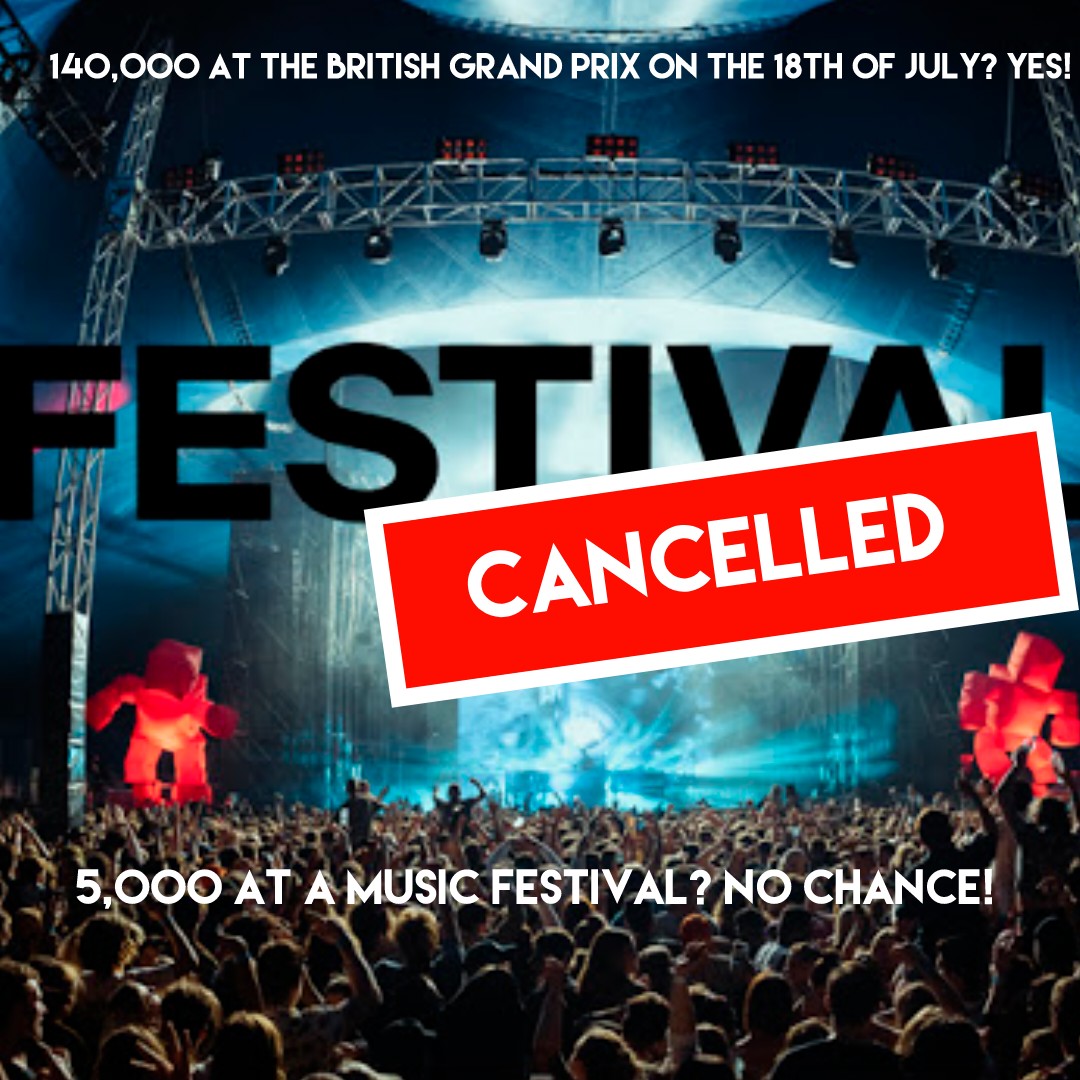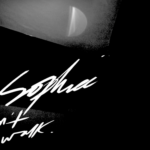Apart from a handful of major festivals running as test events, it is looking like most of the festival season in Britain is staring down the barrel of being cancelled for a second year running due to a lack of clear guidance, certainty, and a government insurance scheme. Festivals are currently in a no-win situation.
Of course, nobody wants to fuel this third wave of Covid sparked by the Delta variant by opening a large number of mass events without measures, when despite the great work being done by the NHS to deliver vaccines, the number of positive cases is beginning to climb once again. We need to be led by the figures and health must come first, despite people’s totally understandable frustration and the devastation being caused to the music industry.
Yet the contradiction of sports events going ahead, like the Euros football at Wembley Stadium (that lead to a surge in 2000 Covid cases); a half-capacity Wimbledon and the British Grand Prix with 140,000 campers is very jarring.
It’s devastating for many independent festivals like Y Not, Kendal Calling, Black Deer, Truck and WOMAD which have all been cancelled in recent weeks, and this could now be the second fallow year and many festivals may not survive. If the UK government backed them, though, with an insurance scheme that would give them the ability to plan for their events, chances of survival would be greatly increased. Both of the Kendal Calling and WOMAD organisers criticised the government saying that they were unable to go ahead without guidance from the pilot events and without festival insurance.
A report released said the lack of government-backed insurance indemnity against the risk of cancellation due to the pandemic was a “survival threat to festivals”, an industry that generates £1.76bn and employs 85,000 people. Andy Smith, the director of Kendal Calling, told the BBC that the lack of urgency has cost his event and many others, including Boomtown, Deer Shed Festival and Black Deer Festival in Kent. “Even if we found out tomorrow that we could go ahead, it’s too late now. The insurance would have given us confidence to press on,” he said.
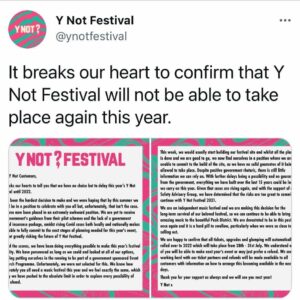
WOMAD festival’s Peter Gabriel also issued a statement cancelling its event, which could cost them up to 1 million pounds: “Since the government decision to extend the Phase 3 restrictions by at least four weeks (to the 19th of July, 72 hours before WOMAD should open its gates) we have been seeking urgent clarification from the DCMS and Public Health England as to what this means for large scale events such as WOMAD. Whilst the Prime Minister and his colleagues say there will be no restrictions on society at that point, we have been unable to get any confirmation of what the plan is.
A few days after that extension the DCMS sought applications from festivals taking place within that extension period to join the next stage of its Event Research Programme. As WOMAD takes place after that period, we did not qualify.”
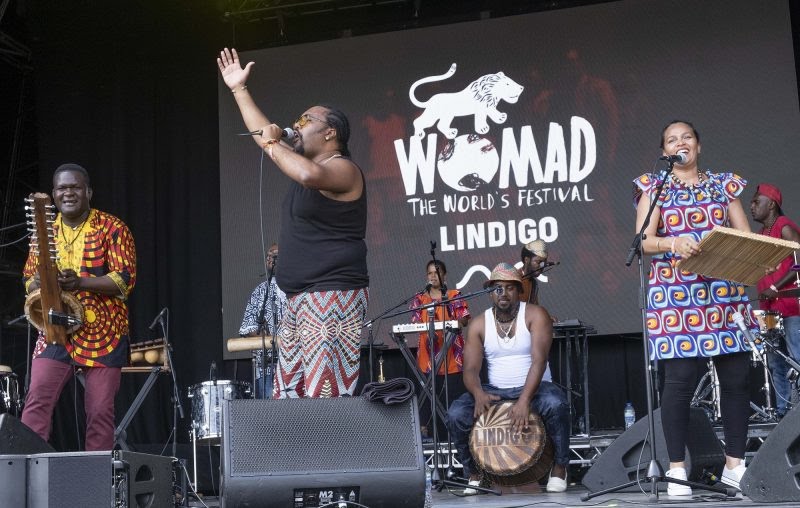
(WOMAD 2019 CREDIT: David Corio/Redferns)
With the 19th of July and its final stage of lockdown easing in England creeping ever nearer, the government need to offer clarity on the protocols of and support for festivals that are still hoping to take place after that date.
John Harris in the Guardian spoke to various festival organisers and describes “a picture of huge supply chains – dealing with everything from portable buildings, through security, to food – that have been hanging on for months, and are now reaching a crunch point. The result: the AIF says that over a third of summer festivals with room for more than 5,000 people have already been cancelled, and insiders reckon many more will follow.”
Paul Reed, chief executive of the Association of Independent Festivals, said UK festivals are looking with envy at Austrian, Danish, Swedish and German events that have government-backed insurance. “It feels like the UK festival industry is being pushed to another cliff edge. The government just aren’t stepping up on this insurance issue.”
The government trumpeted a £34 million Cultural Recovery Fund but regardless of the fund without the guarantees, many festivals still will be forced to cancel. Simon Taffe, curator and director of End of the Road festival, did receive a £500,000 Arts Council grant. But with no insurance forthcoming, that money would currently only cover their losses. He told the Guardian: “Our festival is at the beginning of September, but I feel for anyone who has to make decisions now. I’ve already spent so much money, so it would be silly for me not to spend another £50,000 to get to July 17 – in terms of pure gambling mathematics.”
Ben Robinson, Festival Director of Blue Dot and Kendal Calling, tweeted that culture minister Oliver Dowden’s decisions equal the “cancellation of 2021 UK festival season by extending pilot events & event research programme guidance beyond the 19th July reopen date > Latitude Festival takes place on 22nd July > data takes weeks to process & become guidance > Game over for 2021!”
Only 15 out of 58,000 people tested positive for Covid-19 following government-run trial events such as May’s Blossoms show at Sefton Park, the clubbing test nights in Liverpool and the BRIT Awards.
When it was finally released after festivals threatened the government with legal action, the Events Research Programme (ERP) report concluded that there were “no substantial outbreaks identified by public health teams and their surveillance systems around any of the events”. Of these 28 cases, the report said 11 cases were identified as potentially infectious at an event, and a further 17 were identified as potentially infected at or around the time of an event. The ERP’s outdoor festival pilot at Sefton Park, which was attended by more than 6,000 people, saw two cases.
The report was published within hours of the live music and theatre sector threatening the Government with legal action if it failed to make the findings public.
Association of Independent Festivals CEO Paul Reed said organisers now need clear guidance from Government on what the expectations are for festivals around testing regimes and other protocols this summer: “We are actively engaging with Government on this. For festivals who are still planning, it is clearly not a conversation that can wait until 19 July.
We welcome further festival pilot events as an opportunity for the ERP to scale up and develop the knowledge base around reopening safely but we also simply cannot get stuck in endless rounds of pilots. The objective must be to reopen festivals safely with the right mitigations in place at Step 4.”
Although on the surface these sound like positive results and provide further evidence of how large events could be run safely, only around 15% of attendees returned PCR tests, which is clearly pathetic. I was under the impression that a test event would involve compulsory testing; the onus should also be on the audience to return these tests if they want events to return. Plus, given how unreliable these tests are and that these events were held prior to the surge of the Delta variant, it is hard to take these results at face value.
Greg Parmley, CEO of live music industry umbrella body LIVE, said, “It is completely unfair that our industry finds itself stuck in seemingly interminable rounds of research before we can open when no such research is being done for other places, such as restaurants, shops or public transport. With sensible mitigations, including simple Covid-certification, there is no reason why we should not be able to reopen on 19 July.”
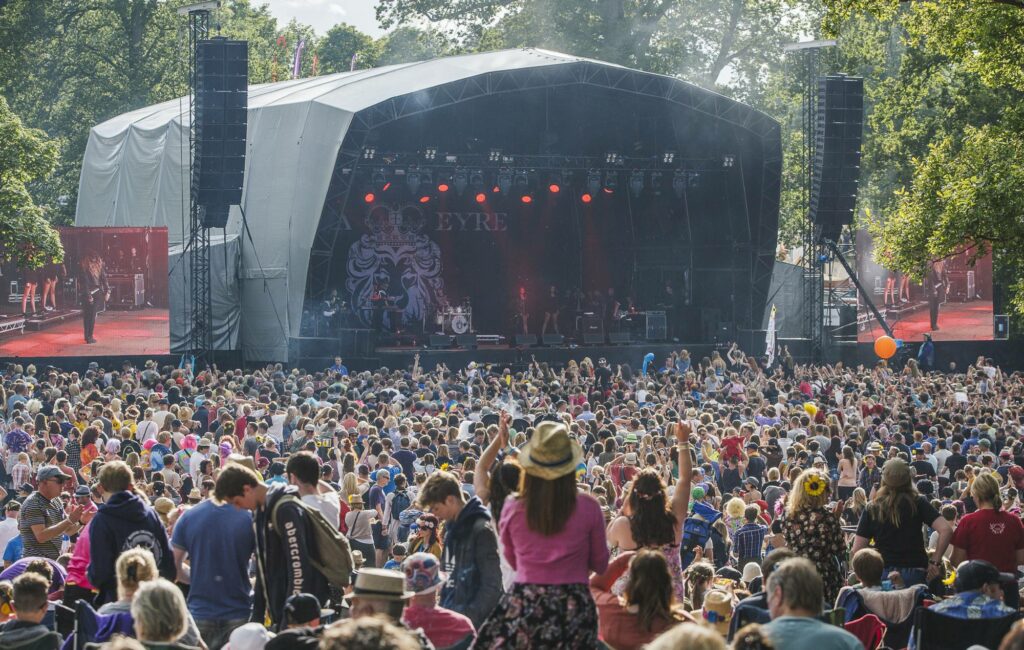
(Kendal Calling)
I think small socially distanced events and more test trials of larger events such as those proposed at Latitude and Tramlines are positive. Some of the bigger ones have scaled down some of their capacity so that social distancing can happen because, after all, it is far safer outside anyway. These measures along with sensible protocols such as providing a clear test before entry or proof of double vaccination prior to entery of an event, would be sensible. These might be the way to move forward with larger-scale music festivals.
But when large sporting events are happening even given the new variant, it does beg the question of why is sport more important than music and culture? This government have been constantly changing their tune on reopening moving the dates further back and haven’t given the sector clear guidance on how to operate or enough support to the arts and music sector a pathetic £495m out of the government’s much-trumpeted cultural recovery fund of 1.3 billion announced last year, has been paid out this year.
This is compounded when further account is taken of their attempt to lump outdoor music events in with indoor when the risks are quite different. It is said that large indoor events with high crowd density and proximity may pose a greater potential risk of transmission as a result of closeness and poor ventilation and that mitigations such as face coverings, ventilation, testing, restrictions on food and drink, and social distancing/capacity caps all contributed to reducing transmission risk.
Michael Kill, Night Time Industries Association CEO says: “We are being marginalised by a Government that has no regard or value for our sector, we have businesses suffering, peoples livelihoods destroyed and youth culture excluded.”
This is coupled with the government’s various cuts to music in schools and their failure to address the many and varied Brexit issues for touring musicians. One can only conclude that the UK government are engaged in their own form of “culture wars” where sport is more profitable and advantageous to them politically than music or art. Maybe this is because music and art spawn oppositional culture? But, given the music industry brought in £5 billion a year to the economy prior to the pandemic, it is a hammer blow to the music industry and a sickening tragedy for many independent festivals, not to mention countless live venues that are vital to grassroots music as well.
Much of this was cripplingly predictable last year. The government has constantly pushed their reopening dates back for eighteen months now and the uncertainty was caused by the waves of the virus including the Delta variant which was imported into the country via India as the UK government failed to quarantine the borders. So maybe some festivals shouldn’t have even gone ahead or made announcements from the outset when there was still large amounts of uncertainty surrounding the opening, but festivals book well in advance – often a year to two years – and if they wanted them to happen they had to announce early and start to sell tickets. It may also be argued that there are simply too many festivals in the UK now with many focused too heavily on appealing to a retro and nostalgic market, as can be seen by many that are headlined by the male-heavy “lad bands” of the ‘90s and ‘00s. But the great independent festivals such as Green Man, Focus Wales and End of the Road and many others are all being swept up in this mess. The larger festivals and their bigger backing will probably still survive but many of the boutique festivals won’t be so lucky.
This is a threat to not only the festival sector, but a further hit to music at a time when artists have been devastated by a lack of live shows. We have to remember there is a trickle-down effect when events are cancelled, impacting roadies, bookers, sound engineers, tech staff, rehearsal spaces, studios and the artists involved who have often sunk financial resources into them.
Catherine Anne Davies aka the Anchoress tweeted: “I know we’re all supposed to be optimistic about live music returning but seeing the ever-accumulating announcements about festivals postponing is frightening. What happens to acts that can’t afford to “rest” for another year? And the costs I’ve already had to payout.”
Like most music fans who have been starved of live shows for eighteen months, I am really desperate to see live music again but it has to be safe to do so first. I am not sure I would personally feel comfortable in a cramped venue right now unless there was clear guidance on social distancing and testing and maybe a check on who had two doses of the vaccine. And that is the issue for smaller venues, most of whom won’t break even in a socially distanced environment, but that’s what is needed right now. Indeed, despite the Welsh parliament’s greater clarity, many local venues in my home city of Cardiff have stopped even booking shows until the position overall becomes clearer.
If anything is to be salvaged from music festivals in the United Kingdom this year then the government urgently needs to offer support, clarity and full guidance. If they don’t many festivals may no longer exist after two fallow years.

